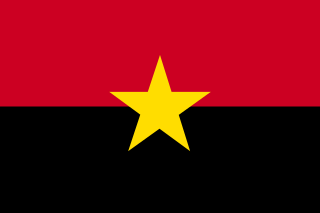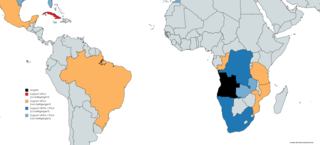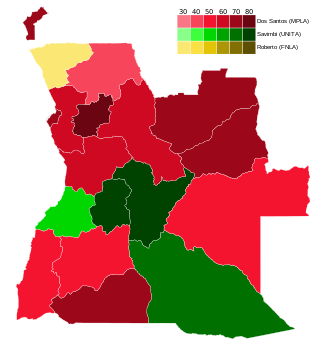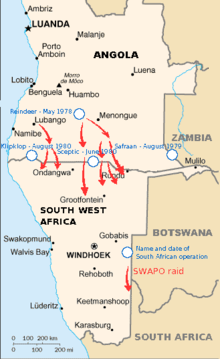
Angola is a country in southwestern Africa. The country's name derives from the Kimbundu word for king. Angola was first settled by San hunter-gatherer societies before the northern domains came under the rule of Bantu states such as Kongo and Ndongo. In the 15th century, Portuguese colonists began trading, and a settlement was established at Luanda during the 16th century. Portugal annexed territories in the region which were ruled as a colony from 1655, and Angola was incorporated as an overseas province of Portugal in 1951. After the Angolan War of Independence, which ended in 1974 with an army mutiny and leftist coup in Lisbon, Angola achieved independence in 1975 through the Alvor Agreement. After independence, Angola entered a long period of civil war that lasted until 2007

The National Union for the Total Independence of Angola is the second-largest political party in Angola. Founded in 1966, UNITA fought alongside the Popular Movement for the Liberation of Angola (MPLA) in the Angolan War for Independence (1961–1975) and then against the MPLA in the ensuing civil war (1975–2002). The war was one of the most prominent Cold War proxy wars, with UNITA receiving military aid initially from People's Republic of China from 1966 until October 1975 and later from the United States and apartheid South Africa while the MPLA received support from the Soviet Union and its allies, especially Cuba.

The People's Movement for the Liberation of Angola, for some years called the People's Movement for the Liberation of Angola – Labour Party, is an Angolan left-wing, social democratic political party. The MPLA fought against the Portuguese army in the Angolan War of Independence from 1961 to 1974, and defeated the National Union for the Total Independence of Angola (UNITA) and the National Liberation Front of Angola (FNLA) in the Angolan Civil War. The party has ruled Angola since the country's independence from Portugal in 1975, being the de facto government throughout the civil war and continuing to rule afterwards.

The National Front for the Liberation of Angola is a political party and former militant organisation that fought for Angolan independence from Portugal in the war of independence, under the leadership of Holden Roberto.

The Angolan War of Independence, called in Angola the Luta Armada de Libertação Nacional, began as an uprising against forced cultivation of cotton, and it became a multi-faction struggle for the control of Portugal's overseas province of Angola among three nationalist movements and a separatist movement. The war ended when a leftist military coup in Lisbon in April 1974 overthrew Portugal's Estado Novo dictatorship, and the new regime immediately stopped all military action in the African colonies, declaring its intention to grant them independence without delay.

Álvaro Holden Roberto was an Angolan politician who founded and led the National Liberation Front of Angola (FNLA) from 1962 to 1999. His memoirs are unfinished.

The Angolan Civil War was a civil war in Angola, beginning in 1975 and continuing, with interludes, until 2002. The war began immediately after Angola became independent from Portugal in November 1975. It was a power struggle between two former anti-colonial guerrilla movements, the communist People's Movement for the Liberation of Angola (MPLA) and the anti-communist National Union for the Total Independence of Angola (UNITA).
Operation Savannah was the South African code name for their military incursion into Angola in 1975–1976. It was part of the South African Border War and arose due to the Angolan War of Independence. The operation also materially influenced the subsequent Angolan Civil War. South African forces invaded deep into Angola with the objective of driving the MPLA, Soviet and Cuban forces out of southern Angola so as to strengthen the position of UNITA, the main opponent of the MPLA and an ally of South Africa.

Angola and the United States have maintained cordial diplomatic relations since 1993. Before then, antagonism between the countries hinged on Cold War geopolitics, which led the U.S. to support anti-government rebels during the protracted Angolan Civil War.
The military history of Cuba begins with the island's conquest by the Spanish and its battles afterward to gain its independence. After the Communist takeover by Fidel Castro in 1959, Cuba became involved in many major conflicts of the Cold War in Africa and the Middle East, where it supported Marxist governments and fought against Western proxies. Castro's Cuba had some 39,000–40,000 military personnel abroad by the late 1970s, with the bulk of the forces in Sub-Saharan Africa but with some 1,365 stationed in the Middle East and North Africa. Cuban forces in Africa were mainly black and mulatto.

General elections were held in Angola on 29 and 30 September 1992 to elect a President and National Assembly, the first time free and multi-party elections had been held in the country. They followed the signing of the Bicesse Accord on 31 May 1991 in an attempt to end the 17-year-long civil war. Voter turnout was 91.3% for the parliamentary election and 91.2% for the presidential election.
The Alvor Agreement, signed on 15 January 1975 in Alvor, Portugal, granted Angola independence from Portugal on 11 November and formally ended the 13-year-long Angolan War of Independence.
The 1970s in Angola, a time of political and military turbulence, saw the end of Angola's War of Independence (1961–1975) and the outbreak of civil war (1975–2002). Agostinho Neto, the leader of the People's Movement for the Liberation of Angola (MPLA), declared the independence of the People's Republic of Angola on November 11, 1975, in accordance with the Alvor Accords. UNITA and the FNLA also declared Angolan independence as the Social Democratic Republic of Angola based in Huambo and the Democratic Republic of Angola based in Ambriz. FLEC, armed and backed by the French government, declared the independence of the Republic of Cabinda from Paris. The National Liberation Front of Angola (FNLA) and the National Union for the Total Independence of Angola (UNITA) forged an alliance on November 23, proclaiming their own coalition government based in Huambo with Holden Roberto and Jonas Savimbi as co-presidents and José Ndelé and Johnny Pinnock Eduardo as co-Prime Ministers.
In the 1980s in Angola, fighting spread outward from the southeast, where most of the fighting had taken place in the 1970s, as the African National Congress (ANC) and SWAPO increased their activity. The South African government responded by sending troops back into Angola, intervening in the war from 1981 to 1987, prompting the Soviet Union to deliver massive amounts of military aid from 1981 to 1986. The USSR gave the Angolan government over US$2 billion in aid in 1984. In 1981, newly elected United States President Ronald Reagan's U.S. assistant secretary of state for African affairs, Chester Crocker, developed a linkage policy, tying Namibian independence to Cuban withdrawal and peace in Angola.

Relations between Angola and South Africa in the post-apartheid era are quite strong as the ruling parties in both states, the African National Congress in South Africa and the MPLA in Angola, fought together during the Angolan Civil War and South African Border War. They fought against UNITA rebels, based in Angola, and the apartheid-era government in South Africa which supported them. Nelson Mandela mediated between the MPLA and UNITA during the final years of the Angolan Civil War. Although South Africa was preponderant in terms of relative capabilities during the late twentieth century, the recent growth of Angola has led to a more balanced relation.

The Cuban intervention in Angola began on 5 November 1975, when Cuba sent combat troops in support of the communist-aligned People's Movement for the Liberation of Angola (MPLA) against the pro-western National Union for the Total Independence of Angola (UNITA) and National Liberation Front of Angola (FNLA). The intervention came after the outbreak of the Angolan Civil War, which occurred after the former Portuguese colony was granted independence after the Angolan War of Independence. The civil war quickly became a proxy war between the Eastern Bloc led by the Soviet Union and the Western Bloc led by the United States. South Africa and the United States backed UNITA and the FNLA, while communist nations backed the MPLA.

During Angola's civil war, Cuban forces fought alongside the Marxist–Leninist People's Movement for the Liberation of Angola (MPLA) government; against the Western-backed National Union for the Total Independence of Angola (UNITA) and National Liberation Front of Angola (FNLA) guerrillas who were aided by the South-African army. The present day outcome of the war resulted in the MPLA changing from a Marxist–Leninist party to a multi-party democratic system based on neoliberal principles. From an economic standpoint, Cuba has lost its preferred status among Angolans and South Africa has become the biggest single investor and trading partner with Angola.

Soviet–Angolan relations were close until the Angolan government renounced Marxist-Leninism in 1990 and adopted a pro-Western foreign policy. The close, personal relationship between President Agostinho Neto and Cuban leader Fidel Castro complicated the Soviet Union's involvement in the Angolan Civil War and foiled several assassination attempts against Neto.
In the Angola–Cuba Declaration of 1984, signed 19 March 1984 in Havana by president José Eduardo dos Santos of Angola and Fidel Castro, premier of Cuba, the two countries agreed to the withdrawal of Cuban forces from Angola after the withdrawal of South African troops from Angola and Namibia, and after UN-Security Council resolution 435 on Namibian independence was strictly applied.

The People's Republic of Angola was the self-declared socialist state which governed Angola from its independence in 1975 until 25 August 1992, during the Angolan Civil War.















